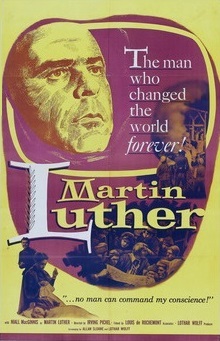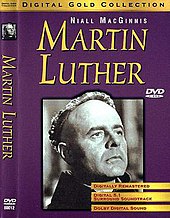Martin Luther (1953 film)
| Martin Luther | |
|---|---|
 Theatrical release poster | |
| Directed by | Irving Pichel |
| Written by | |
| Produced by | Lothar Wolff |
| Starring | Niall MacGinnis |
| Cinematography | Joseph C. Brun |
| Edited by | Fritz Stapenhorst |
| Music by | Mark Lothar |
| Distributed by | De Rochemont/Lutheran Productions |
Release dates |
|
Running time | 105 min |
| Country | United States/West Germany |
| Language | English |
| Budget | $500,000[2] or $350,000[3] |
| Box office | $3 million[3] |
Martin Luther is a 1953 American–West German film biography of Martin Luther. It was directed by Irving Pichel, (who also plays a supporting role), and stars Niall MacGinnis as Luther. It was produced by Louis de Rochemont and RD-DR Corporation in collaboration with Lutheran Church Productions and Luther-Film-G.M.B.H.
The National Board of Review named the film the fourth best of 1953. It was nominated for two Oscars, for Best Cinematography (Black-and-White) (Joseph C. Brun) and Art Direction/Set Decoration (Black-and-White) (Fritz Maurischat, Paul Markwitz).[4] The music was composed by Mark Lothar and performed by the Munich Philharmonic Orchestra. It was filmed at the Wiesbaden Studios in Hesse in West Germany.
A notice at the beginning of the film characterizes it as a careful and balanced presentation of Luther's story: "This dramatization of a decisive moment in human history is the result of careful research of facts and conditions in the 16th century as reported by historians of many faiths." The research was done by notable Reformation scholars Theodore G. Tappert and Jaroslav Pelikan who assisted Allan Sloane and Lothar Wolff.
The film was commercially very successful.[2]
Summary[edit]

The time frame of the film is 1505–1530: Luther's entrance into St. Augustine's Monastery in Erfurt to the presentation of the Augsburg Confession. It recounts Martin Luther's struggle to find God's mercy: his discovery of the gospel in Romans 1:17, the posting of the Ninety-five theses, and the subsequent controversy, which led to Luther's being separated from the church of Rome. It shows Luther's resistance to the forces of radicalism, and his work to establish and maintain the evangelical movement of his day. The dramatic climax of the film is Luther's "Here I Stand" speech before the 1521 Diet of Worms, and the grand finale is the singing of "A Mighty Fortress Is Our God" by Luther's congregation.
Plot[edit]
This article's plot summary may be too long or excessively detailed. (August 2021) |
Narrator John Wiggin begins the film with a scholarly overview of the place and time of the life of Martin Luther. He points out that power is divided between the Emperor of the Holy Roman Empire and the Roman Catholic Church. To set the stage for the presentation of Luther's conflict with the church of his day he states, "the church had largely forgotten the mercies of God and, instead, it emphasized God's implacable judgments."
Since he will soon be entering St. Augustine's Monastery, Martin Luther holds a "going away" party at a local pub with his fellow law students. Conspicuous among his guests is George Spalatin, who provides an inquiring interest into Luther's motivation to leave the study of law.
Luther's entrance into monastic life is then portrayed. He does not find the spiritual peace he sought even though he follows a strict regimen of ascetic piety to the point of flagellating himself half to death.
He is shown in sheer terror at the celebration of his first Mass as a newly ordained priest.
After he struggles through his first Mass he confesses to his mentor, Vicar General Johann von Staupitz that he cannot love God. Subsequently, the dour-faced prior proposes expelling Luther from the order because of his restless mind, but Staupitz believes that rigorous theological study and a pilgrimage embassy to Rome will help the troubled young friar.
After he had returned from Rome, just after completing a prayer office, Luther expresses his opinion to his fellow friars that the common people could more easily find God to be merciful if they had the Holy Scriptures in
Then while studying in the Erfurt university library Luther is met by George Spalatin, who had also left the study of the law for a vocation in the church: in his case to serve Frederick III, Elector of Saxony.
Spalatin renews his interest in Luther's quest, "Have you found what you were looking for?" Luther responds, "Not yet." Spalatin then recommends Luther to the Elector as a preacher at the castle church and professor of Biblical studies at the newly founded University of Wittenberg. Luther is then shown baptizing an infant in the castle church.
At Wittenberg, Luther receives his degree of Doctor of Theology when he promises to be a faithful teacher in the church; however, he has difficulty in accepting the practice even there in Wittenberg of collecting and showcasing relics.
The film presents Luther as having undergone his "reformatory discovery" through his study of the Epistle to the Romans for his lectures on this Biblical book.
He tells his mentor Staupitz that one only need have faith in Jesus Christ for salvation. Staupitz leaves unpersuaded,
but Luther writes the word "sola" (alone) in the margin of his Latin Bible to show his firm persuasion in the doctrine of justification by faith alone.
A few years go by. It is now 1517, and in Rome Pope Leo X arranges with Archbishop Albert to promulgate in Germany a special jubilee indulgence. Johann Tetzel is the main preacher of this indulgence, and his pitch is presented in public with the beating of drums. That same evening Martin Luther comes across one of his parishioners in a drunken stupor with the conviction that he does not need to go to confession anymore because he has bought one of Tetzel's indulgences.
